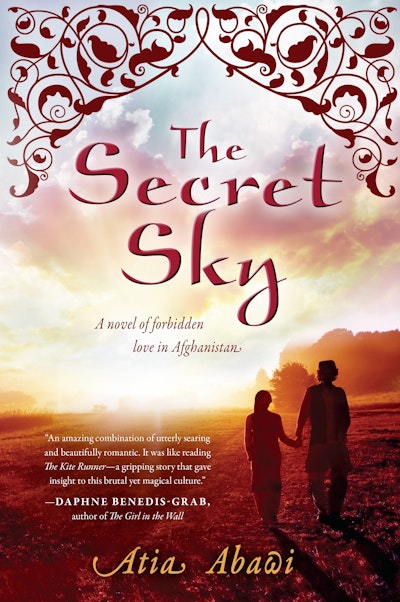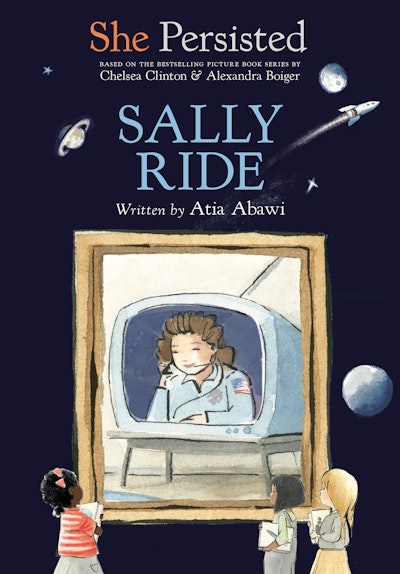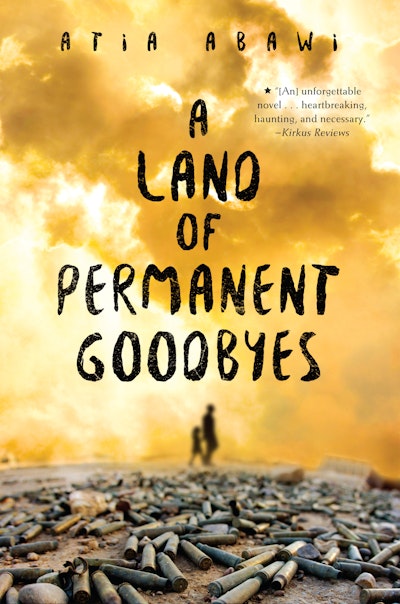- Published: 2 September 2014
- ISBN: 9780698158542
- Imprint: PEN US eBook Childrens
- Format: EBook
- Pages: 304
The Secret Sky
A Novel of Forbidden Love in Afghanistan
- Published: 2 September 2014
- ISBN: 9780698158542
- Imprint: PEN US eBook Childrens
- Format: EBook
- Pages: 304
"ABAWI, Atia. The Secret Sky. 320p. ebook available. glossary. Philomel. Sept. 2014. Tr $17.99. ISBN 9780399160783. LC 2013026895.
Gr 9 UpFatima and Samiullah have known each other their whole lives, growing up together in a rural village in Afghanistan. She is a Hazara girl, he a Pashtun boy; they should not be considered equal, but their village is relatively open-minded. Sami has recently returned from a stint at the madrassa, an Islamic religious school. Now a teen, it is no longer permissible for Fatima to spend time alone with any men outside of her family. However, she and Sami cannot deny their mutual attraction and begin spending time together in secret, risking their lives in doing so. Rashid, Sami's cousin, discovers their secret and threatens to reveal all. This is an important story; it gives sensitive insight to a culture that many Americans do not understand beyond what they read in headlines. It also does not shy away from the horrors of a deeply divided, war-torn country: boys are raped, murder is widespread, and parents mutilate their own daughters. The author's introduction, note, and glossary give helpful, enriching background. That said, it is difficult to get past the marginal writing. Clichés abound--water sparkles like diamonds, hearts race and skip a beat regularly, lips are consistently described as "perfect" or "heart-shaped"--and there is more telling than showing. Rashid's chapters are a weak spot. Meandering prose about pomegranate trees disrupt the story's flow and pacing. The author has an authoritative voice about Afghan culture, and so many readers could benefit from a well-written, gripping story about that country's nuances and challenges; regrettably, this is not it."--Laura Lutz, Convent of the Sacred Heart, New York City
"Three characters take turns narrating foreign correspondent Abawi's debut, about a cross-cultural love affair that tears at a small Afghan community. Pashtun landowners and Hazara farmers maintain a respectful peace--their children play together, but a "Hazara girl could never marry a Pashtun boy." Fatima dreams of a future in Kabul, where girls "can become doctors, lawyers, midwives and even artists!" After Samiullah returns home, disillusioned with teachers' cruel indoctrination at his madrassa, his childhood friendship with Fatima blossoms into love. Meanwhile, Samiullah's cousin Rashid seeks to gain favor with the local Taliban by reporting their attachment, resulting in horrific consequences for both families. Decades of tribal strife influence the present, causing some to cling to tradition, while others encourage change, like a grandmother teaching her granddaughter to read. Disturbing depictions of physical, emotional, and sexual violence against women, men, and children, both within families and between different groups, contrast with extravagant acts of courage, kindness, and sacrifice. Throughout, Fatima, Samiullah, and Rashid wrestle with what constitutes faithful living, as represented by two mullahs offering wildly different interpretations. A suspenseful, enlightening, and hopeful love story. Ages 14up. (Sept.)"
Blurbs for THE SECRET SKY:
"[The Secret Sky is] a tale of the indomitable Afghan spirit of hope and love. Among the many novels set in Afghanistan for young people or for adults, The Secret Sky stands alone. Unputdownable. Unforgettable."--Trent Reedy, author of Words in the Dust
"The Secret Sky brilliantly captures the magic and the heartbreak of Afghanistan as only someone rooted in its mystery can....This first novel by a top foreign correspondent has the authenticity of raw journalism and the poetry of a gifted writer. A must read for anyone who wants to understand the contradictions of the Afghan soul."--Andrea Mitchell, NBC News Chief Foreign Affairs Correspondent and anchor of Andrea Mitchell Reports
"A riveting tale written from the heart....This powerful love story will leave you angry at injustice, and awed by courage. It shocks and inspires."--Lyse Doucet, Chief International Correspondent, BBC
"The Secret Sky is an amazing combination of utterly searing and beautifully romantic. It was like reading The Kite Runner--a gripping story that gave insight to this brutal yet magical culture."--Daphne Benedis-Grab, author of The Girl in the Wall
At its heart, this gripping debut by an Afghan-American journalist is a simple love story, but in today's Afghanistan--riven by culture clashes, scarred by decades of war--nothing is simple.
Fatima's tiny village is isolated from city amenities but not from war. Its Pashtun and Hazara families have endured heartbreaking losses and, amid crushing poverty, hold tight to what remains. The elderly woman teaching her to read recalls freer times, but Fatima, who's Hazara and barely past puberty, faces a drastically limited future--her mother wants her married. When Fatima's childhood Pashtun friend, Samiullah, returns from his madrassa, their mutual attraction grows. But even chaste meetings violate strict cultural edicts; transgressions can have lethal consequences. Their discovery by Sami's cousin Rashid, embittered by jealousy and family tragedy, sets in motion events that change their lives, and those of their families and village, forever. All characters are Afghans, political attributions vague or neutral (the Taliban's criticized but not vilified). Abawi reserves condemnation for the violent, twisted opportunists who take advantage of chaos. Juxtaposed with horrific events, the tone and stylistic conventions of lighter teen fare occasionally feel jarring. First-person, present-tense narration confines the story to the here and now, yet that immediacy brings closer this ancient, complicated country bound to ours.
Riveting plot, sympathetic characters and straightforward narration studded with vivid, authentic detail: a top choice. (author's note, glossary) (Fiction. 12 & up)
Although the subtitle may mislead with tabloid-style possibilities, Fatima and
Samiullah's love blossoms shyly from a childhood friendship, and Abawi depicts it deftly. The two are teenagers, daughter of a Hazara tenant farmer and son of the Pashtun landowner. Readers will recognize the Pashtun-Hazara class tensions that Khaled Hosseini etched so powerfully in The Kite Runner (Riverhead, 2003). No sooner has the couple's love awakened than Rashid, Samiullah's jealous cousin, decides it must be publicized and punished. The innocent teenagers have not yet even declared their feelings to each other when Rashid brings down upon them the fury of their parents and of a murderous band of Taliban-like thugs. Rashid fancies himself a true Muslim, out to purify his society. He learns only gradually how religious extremism can cloak inhuman greed and brutal power-mongering. Rashid's posturing is off-putting at first, but a wise mullah sows seeds of humanity when Rashid grasps at a vision of forgiveness for his betrayals. There is a positive ending for Fatima and
Samiullah, although it is darkened by the sacrifice of several innocent lives and
deep-rooted Afghan attitudes toward the role of women--most achingly, that of
Fatima's mother, who angrily scalds her daughter with boiling water.
Atawi lived almost five years in Afghanistan as a TV news correspondent
and she writes that this story was influenced by real events and real people. Like
the book itself, that realization is both heartbreaking and heartwarming.
Fatima (Fato) is from the Hazara tribe, and Samiullah (Sami) is Pashtun, the largest ethnic group in Afghanistan. Their cultural differences make the conflict between the Capulets and Montagues look like child's play. Fato and Sami were childhood friends, and after Sami returns early from madrassa, the training regime for young men of his standing, they resume clandestine meetings that are fraught with peril. When Rashid, Sami's zealous cousin, finds them together, their journey turns from danger to torture and worse. Afghanistan is comprised of an intricate society of complex ancient ethnic histories. Abawi writes with a gentle hand as she tells a tale of tribal rituals that's chilling to the bone. Readers will find Abawi's honesty and trust in her audience reminiscent of Deborah Ellis' accessibly written titles, such as My Name Is Parvana (2012), about life as a young person, especially a female, in Afghanistan. Abawi's introduction, author's note, and generous glossary supply welcome context for this heartbreaking rendering of forbidden love.
This is a novel about young people in Afghanistan who are in love but aren't allowed to be, and contains enough brutality that the reader should be warned. Sami is Pashtun, a member of the landowner's family. Fatima is Hazara and her family works the land. When Sami's cousin Rashid sees them together, his misguided beliefs cause events that become violent and life-threatening for everyone involved. Fatima and Sami have no choice but to sacrifice everything. The story is briskly paced and draws the reader in. The characters evoke much sympathy. A glossary is provided for the many Afghan words which add authenticity. The author delivers an upbeat ending which is well-deserved after this harrowing journey. Students who enjoy Romeo & Juliet stories and can handle the senseless violence will enjoy this one.
Knowing that her role in her small Afghan village will change now that she's coming into womanhood, Fatima, a girl of the Hazara tribe, is desperate to hold onto the freedom of childhood. When Sami, a Pashtun boy who was once her best friend and constant companion, returns early from a failed stint at a madrassa (an Islamic religious school), the two fall into their old routine of meeting in the local woods and spending their days together. Such companionship, however, is viewed as un- forgivably sexual by the village, and when Sami's cousin Rashid reveals their secret, the pair is forced to flee from parents who would see them beaten and married off separately (custom forbids their marrying each other) as soon as possible. Obsessed with seeing them punished, Rashid reports their activity to a local warlord loosely associated with the Taliban, triggering a nightmare of violence that horrifies even Rashid, as Fatima's baby sister is killed and Sami's family's land is violated as the warlord hunts the pair down. The romance here, while sweet and tender, serves mostly as a catalyst to explore the larger cultural influences and conflicts that make up Afghanistan. Characters therefore occasionally seem more like token represen- tations of various beliefs and traditions (e.g., a friend's grandmother insists that Fatima learn to read, while Rashid spouts off Taliban rhetoric), but the collective whole makes for a fascinating, if disturbing, examination of what Abawi calls in her author's note a "traditionally conservative society" faced with globalization and modernity. Despite the violence and brutality they encounter, Sami and Fatima make it out alive and together, providing a bit of hope in an otherwise bleak tale A glossary is included.





